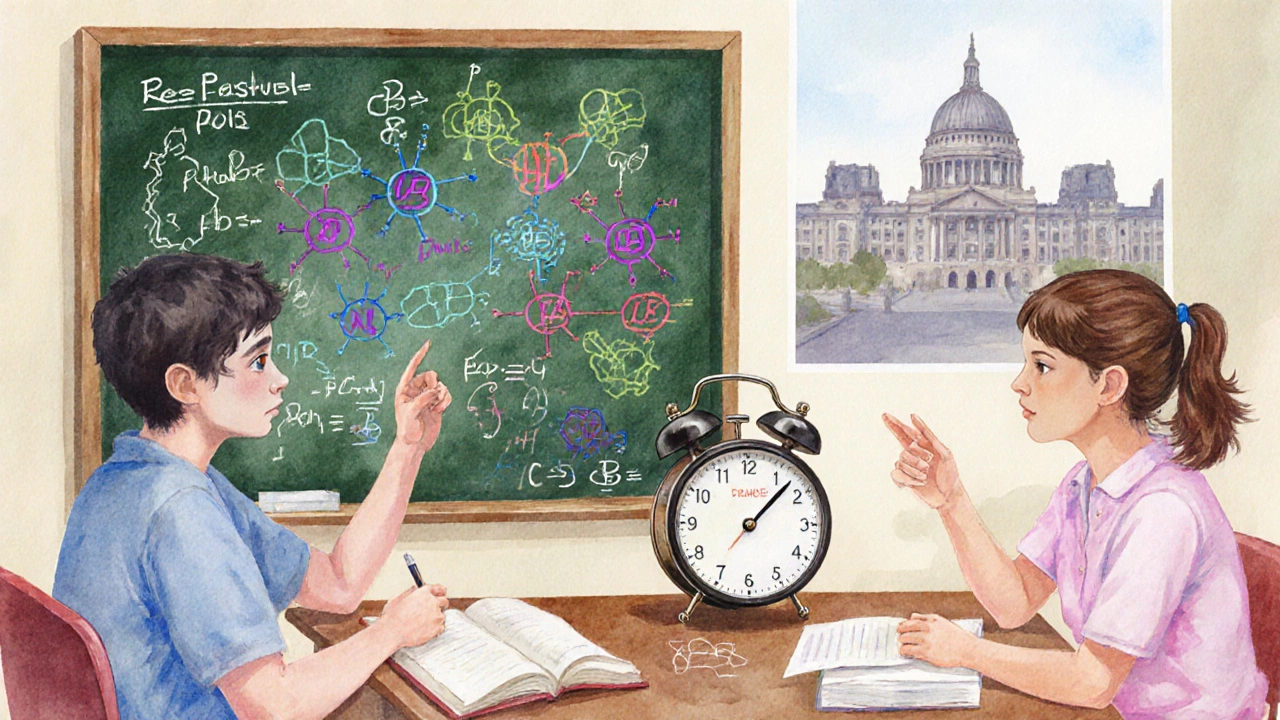JEE Subject Study Time Allocator
Optimize Your JEE Study Plan
Enter your current mock scores and target goals to get personalized study time recommendations based on your strengths and weaknesses.
Physics
Current: %
Gap: %
Recommended minutes
Chemistry
Current: %
Gap: %
Recommended minutes
Mathematics
Current: %
Gap: %
Recommended minutes
Study Strategy Tips
For Physics: Focus on problem-solving drills and conceptual clarity. For Chemistry: Practice reaction mechanisms and thermodynamics calculations. For Mathematics: Master speed and accuracy in multi-step problems.
Remember: This tool uses your input data combined with JEE performance statistics from the article to provide personalized recommendations.
When you stare at the JEE (Joint Entrance Examination) syllabus, the first question that pops up is often, hardest JEE subject. Is it the abstract world of Physics, the reaction‑heavy realm of Chemistry, or the formula‑filled universe of Mathematics? This guide walks you through each subject, breaks down the real‑world challenges, and gives you a practical way to decide where to focus your energy.
Understanding the JEE Landscape
JEE is split into two stages: JEE Main the first screening test that filters millions of aspirants and JEE Advanced the gateway to the Indian Institutes of Technology (IITs). Both exams draw heavily from the 11th‑ and 12th‑grade curriculum set by CBSE the Central Board of Secondary Education, which standardizes school education across India. The official textbooks are the NCERT National Council of Educational Research and Training books, renowned for clear explanations and practice problems.
How Difficulty Is Measured
We assess difficulty using four practical dimensions:
- Conceptual Depth - how many layers of theory you must grasp before solving a problem.
- Problem‑Solving Skill - the level of mathematical manipulation or logical reasoning required.
- Weightage in the Exam - the percentage of total marks a subject contributes.
- Common Pitfalls - typical mistakes that trip up even top scorers.
These factors let us build a realistic picture rather than relying on anecdotal opinions.
Subject‑by‑Subject Breakdown
Below is a concise but thorough look at each core subject.
| Subject | Conceptual Depth | Problem‑Solving Skill | Exam Weightage | Typical Pitfalls |
|---|---|---|---|---|
| Physics (JEE) covers mechanics, electromagnetism, optics, and modern physics | High - concepts often build on each other across chapters. | Medium - many problems require algebraic manipulation and diagram analysis. | ~33% of total marks. | Skipping derivations; mixing units; ignoring sign conventions. |
| Chemistry (JEE) divided into Physical, Organic, and Inorganic sections | Medium - factual recall plus a few deep concepts like thermodynamics. | High - organic mechanisms and physical chemistry calculations demand precision. | ~33% of total marks. | Memorizing reactions without understanding trends; misapplying equations. |
| Mathematics (JEE) includes algebra, calculus, coordinate geometry, and vectors | Medium - most topics are self‑contained, but some (e.g., complex numbers) need layered thinking. | Very High - speed and accuracy in calculations are crucial; many questions are multi‑step. | ~34% of total marks. | Careless arithmetic; overlooking constraints; confusing formulas. |
Why Physics Often Feels the Toughest
Many aspirants label Physics as the hardest because it blends deep theory with visualization. For example, mastering Gauss’s law requires both a solid grasp of electric field concepts and the ability to draw accurate Gaussian surfaces. Miss a single step, and the entire solution collapses. Moreover, the Kota the coaching hub in Rajasthan, known for intensive problem‑solving drills model emphasizes Physics problem sets that are longer and more time‑consuming than those in Chemistry or Mathematics.
That said, difficulty is subjective. Students with strong analytical minds may find Physics intuitive, while those comfortable with formula memorization may breeze through Chemistry.

Real‑World Performance Data
A review of 2023 JEE Advanced results shows the average marks per subject hovered around 55 % for Physics, 58 % for Chemistry, and 61 % for Mathematics. The gap, though modest, points to a slightly steeper learning curve in Physics. The trend repeats across years, reinforcing the perception of Physics as the hardest.
How to Turn the Hardest Subject Into Your Strength
Regardless of which subject feels toughest, the following tactics work across the board:
- Concept Maps: Sketch a quick diagram linking core formulas to their derivations. This visual aid reinforces memory and reveals hidden connections.
- Timed Drills: Use a timer to solve 5‑question blocks. Gradually shrink the time limit; the goal is to build speed without sacrificing accuracy.
- Peer Teaching: Explain a tricky concept to a friend. Teaching forces you to clarify every step.
- Past Paper Analysis: Identify the topics that appear most often and allocate extra practice to them.
- Targeted Feedback: After each mock test, write a one‑page summary of mistakes and the action plan to fix them.
Choosing Where to Invest Your Study Hours
Use the following decision tree to allocate time wisely:
- Score your recent mock in each subject.
- If the gap between your score and the target is < 10 points, maintain current study pattern.
- If the gap is 10‑20 points, add two extra weekly sessions focused on problem types you miss.
- If the gap exceeds 20 points, consider a short‑term intensive course or a tutor for that subject.
This approach keeps you from over‑fixating on a single subject while ignoring the overall balance needed for JEE.

Common Misconceptions About Difficulty
1. “Chemistry is just memorization.” - While factual recall is part of it, organic reaction mechanisms demand logical sequencing similar to problem solving in Physics.
2. “Mathematics is the easiest because it’s all formulas.” - The real challenge lies in applying multiple concepts in a single question, especially in coordinate geometry.
3. “If I’m weak in one subject, I’ll never crack JEE.” - Many top rankers turned a weak area into a strength by following a focused plan.
FAQ
Is Physics really the hardest subject for most JEE aspirants?
Statistical data from recent JEE Advanced papers shows slightly lower average scores in Physics compared to Chemistry and Mathematics, indicating a higher perceived difficulty. However, individual strengths vary, so it’s not a universal rule.
How many hours should I dedicate to the toughest subject each week?
Aim for at least 10‑12 focused hours per week, split into short 2‑hour blocks with regular breaks. Adjust upward if your mock score gap is large.
Can coaching institutes make a hard subject easier?
Yes. Institutes in Kota and other hubs offer specialized batches that break down complex topics into bite‑size lessons, often improving conceptual clarity.
Should I focus on one subject at a time or study them together?
A balanced approach works best. Rotate subjects every few days to keep the mind fresh, but allocate extra sessions to the subject with the biggest score gap.
What resources besides NCERT are useful for the hardest topics?
Books by H.C. Verma (Physics), O.P. Tandon (Chemistry), and M.L. Khanna (Mathematics) are popular. Additionally, solving past JEE papers and using online video platforms for visual explanations can solidify understanding.
Final Thoughts
Identifying the hardest JEE subject is the first step; turning that weakness into a strength is where the real work begins. By measuring your gaps, using targeted study tactics, and leveraging quality resources, you can level the playing field across Physics, Chemistry, and Mathematics. Remember, the exam rewards consistent effort more than raw talent, so keep a balanced schedule and stay adaptable.


